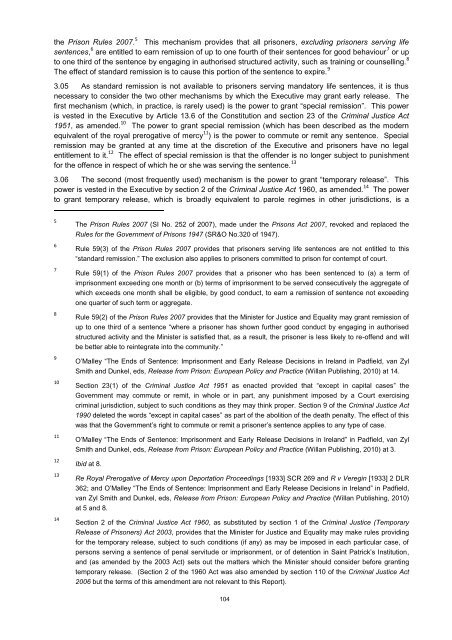Report on Mandatory Sentences - Law Reform Commission
Report on Mandatory Sentences - Law Reform Commission
Report on Mandatory Sentences - Law Reform Commission
Create successful ePaper yourself
Turn your PDF publications into a flip-book with our unique Google optimized e-Paper software.
the Pris<strong>on</strong> Rules 2007. 5 This mechanism provides that all pris<strong>on</strong>ers, excluding pris<strong>on</strong>ers serving life<br />
sentences, 6 are entitled to earn remissi<strong>on</strong> of up to <strong>on</strong>e fourth of their sentences for good behaviour 7 or up<br />
to <strong>on</strong>e third of the sentence by engaging in authorised structured activity, such as training or counselling. 8<br />
The effect of standard remissi<strong>on</strong> is to cause this porti<strong>on</strong> of the sentence to expire. 9<br />
3.05 As standard remissi<strong>on</strong> is not available to pris<strong>on</strong>ers serving mandatory life sentences, it is thus<br />
necessary to c<strong>on</strong>sider the two other mechanisms by which the Executive may grant early release. The<br />
first mechanism (which, in practice, is rarely used) is the power to grant “special remissi<strong>on</strong>”. This power<br />
is vested in the Executive by Article 13.6 of the C<strong>on</strong>stituti<strong>on</strong> and secti<strong>on</strong> 23 of the Criminal Justice Act<br />
1951, as amended. 10 The power to grant special remissi<strong>on</strong> (which has been described as the modern<br />
equivalent of the royal prerogative of mercy 11 ) is the power to commute or remit any sentence. Special<br />
remissi<strong>on</strong> may be granted at any time at the discreti<strong>on</strong> of the Executive and pris<strong>on</strong>ers have no legal<br />
entitlement to it. 12 The effect of special remissi<strong>on</strong> is that the offender is no l<strong>on</strong>ger subject to punishment<br />
for the offence in respect of which he or she was serving the sentence. 13<br />
3.06 The sec<strong>on</strong>d (most frequently used) mechanism is the power to grant “temporary release”. This<br />
power is vested in the Executive by secti<strong>on</strong> 2 of the Criminal Justice Act 1960, as amended. 14 The power<br />
to grant temporary release, which is broadly equivalent to parole regimes in other jurisdicti<strong>on</strong>s, is a<br />
5<br />
6<br />
7<br />
8<br />
9<br />
10<br />
11<br />
12<br />
13<br />
14<br />
The Pris<strong>on</strong> Rules 2007 (SI No. 252 of 2007), made under the Pris<strong>on</strong>s Act 2007, revoked and replaced the<br />
Rules for the Government of Pris<strong>on</strong>s 1947 (SR&O No.320 of 1947).<br />
Rule 59(3) of the Pris<strong>on</strong> Rules 2007 provides that pris<strong>on</strong>ers serving life sentences are not entitled to this<br />
“standard remissi<strong>on</strong>.” The exclusi<strong>on</strong> also applies to pris<strong>on</strong>ers committed to pris<strong>on</strong> for c<strong>on</strong>tempt of court.<br />
Rule 59(1) of the Pris<strong>on</strong> Rules 2007 provides that a pris<strong>on</strong>er who has been sentenced to (a) a term of<br />
impris<strong>on</strong>ment exceeding <strong>on</strong>e m<strong>on</strong>th or (b) terms of impris<strong>on</strong>ment to be served c<strong>on</strong>secutively the aggregate of<br />
which exceeds <strong>on</strong>e m<strong>on</strong>th shall be eligible, by good c<strong>on</strong>duct, to earn a remissi<strong>on</strong> of sentence not exceeding<br />
<strong>on</strong>e quarter of such term or aggregate.<br />
Rule 59(2) of the Pris<strong>on</strong> Rules 2007 provides that the Minister for Justice and Equality may grant remissi<strong>on</strong> of<br />
up to <strong>on</strong>e third of a sentence “where a pris<strong>on</strong>er has shown further good c<strong>on</strong>duct by engaging in authorised<br />
structured activity and the Minister is satisfied that, as a result, the pris<strong>on</strong>er is less likely to re-offend and will<br />
be better able to reintegrate into the community.”<br />
O’Malley “The Ends of Sentence: Impris<strong>on</strong>ment and Early Release Decisi<strong>on</strong>s in Ireland in Padfield, van Zyl<br />
Smith and Dunkel, eds, Release from Pris<strong>on</strong>: European Policy and Practice (Willan Publishing, 2010) at 14.<br />
Secti<strong>on</strong> 23(1) of the Criminal Justice Act 1951 as enacted provided that “except in capital cases” the<br />
Government may commute or remit, in whole or in part, any punishment imposed by a Court exercising<br />
criminal jurisdicti<strong>on</strong>, subject to such c<strong>on</strong>diti<strong>on</strong>s as they may think proper. Secti<strong>on</strong> 9 of the Criminal Justice Act<br />
1990 deleted the words “except in capital cases” as part of the aboliti<strong>on</strong> of the death penalty. The effect of this<br />
was that the Government’s right to commute or remit a pris<strong>on</strong>er’s sentence applies to any type of case.<br />
O’Malley “The Ends of Sentence: Impris<strong>on</strong>ment and Early Release Decisi<strong>on</strong>s in Ireland” in Padfield, van Zyl<br />
Smith and Dunkel, eds, Release from Pris<strong>on</strong>: European Policy and Practice (Willan Publishing, 2010) at 3.<br />
Ibid at 8.<br />
Re Royal Prerogative of Mercy up<strong>on</strong> Deportati<strong>on</strong> Proceedings [1933] SCR 269 and R v Veregin [1933] 2 DLR<br />
362; and O’Malley “The Ends of Sentence: Impris<strong>on</strong>ment and Early Release Decisi<strong>on</strong>s in Ireland” in Padfield,<br />
van Zyl Smith and Dunkel, eds, Release from Pris<strong>on</strong>: European Policy and Practice (Willan Publishing, 2010)<br />
at 5 and 8.<br />
Secti<strong>on</strong> 2 of the Criminal Justice Act 1960, as substituted by secti<strong>on</strong> 1 of the Criminal Justice (Temporary<br />
Release of Pris<strong>on</strong>ers) Act 2003, provides that the Minister for Justice and Equality may make rules providing<br />
for the temporary release, subject to such c<strong>on</strong>diti<strong>on</strong>s (if any) as may be imposed in each particular case, of<br />
pers<strong>on</strong>s serving a sentence of penal servitude or impris<strong>on</strong>ment, or of detenti<strong>on</strong> in Saint Patrick’s Instituti<strong>on</strong>,<br />
and (as amended by the 2003 Act) sets out the matters which the Minister should c<strong>on</strong>sider before granting<br />
temporary release. (Secti<strong>on</strong> 2 of the 1960 Act was also amended by secti<strong>on</strong> 110 of the Criminal Justice Act<br />
2006 but the terms of this amendment are not relevant to this <str<strong>on</strong>g>Report</str<strong>on</strong>g>).<br />
104
















